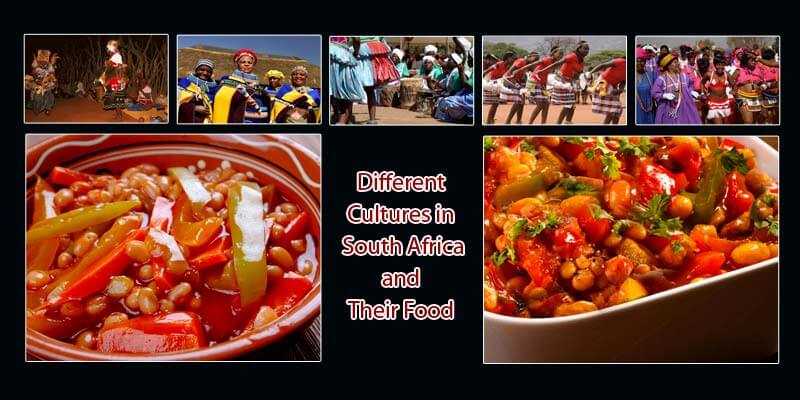
Different Cultures in South Africa and Their Food Zulu and Xhosa
Posted By IshaqIn This Article You will Know:
- How is South Africa a mix of old and new?
- When was the land first inhabited by humans?
- Which cultures trace their roots back to Bantu-speaking peoples?
- How did the coloured ethic community emerge?
Located on the southern most tip of the world’s second largest continent, South Africa is a unique mix of peoples and cultures. She is one of the most industrialized states in Africa, and also serves as the economic hub and powerhouse of southern Africa.
Stretched across an area of over 1.2 million square kilometres, the land is also home to people whose forefathers came from India, Southeast Asia and Europe.
The European settlers, like the Dutch, French and German, first came to the country in the 17th century. The Malay people from Southeast Asia came to the Afrikaners’ land to work on farms. When the British arrived here in 1800s, they brought with them Indian slaves to work on their sugar plantations. And the immigration to South Africa of peoples from other parts of the world still continues.
Coming from diverse backgrounds, the peoples of this southern most African nation have significantly contributed to the richness of her culture. Different groups have their own beliefs, customs and traditions. And each group gives special importance to food, religion, dance, music and art.
In the varied and exciting culture of South Africa, children listen to their elders’ tales, but also watch cartoons on television. While enjoying foods of their ancestors, people also crave for fast food. Similarly, the musicians playing modern music still love to use the traditional African instruments.
Different Cultures in South Africa and Their Food:
Offering an interesting mix of peoples and cultures, South Africa is a modern country with African, Indian, Southeast Asian, and European customs and traditions.
It is home to the descendants of the first human beings who inhabited the land around 20,000 years ago (Clark, 2008: South Africa: The Culture). Funso et al (2004) in their book “Culture and Customs of South Africa” give a different account of the initial inhabitation of land by humans. According to them, the first Homo sapiens lived here as early as over 50,000 years ago.
Other peoples like Zulu, Venda, Ndebele, and Xhosa trace their backgrounds to the Bantu-speaking communities who came to live here around a thousand years ago.
Listed below are the different cultures in South Africa and their food.
Zulu:
Forming the largest ethnic group of South Africa, the members of the Zulu ethnic community refer to themselves as the “people of the heavens”. Under the leadership of Shaka, the Zulu clan merged into a great kingdom.
The Zulu Cuisine:
The Zulu cuisine predominantly comprises of vegetarian dishes that mainly consists of vegies and grains. The traditional dishes use potatoes, pumpkins and maize as common ingredients. Oxen are only slaughtered on special occasions, such as weddings, and the traditional Zulus eat with wooden bowls and spoons.
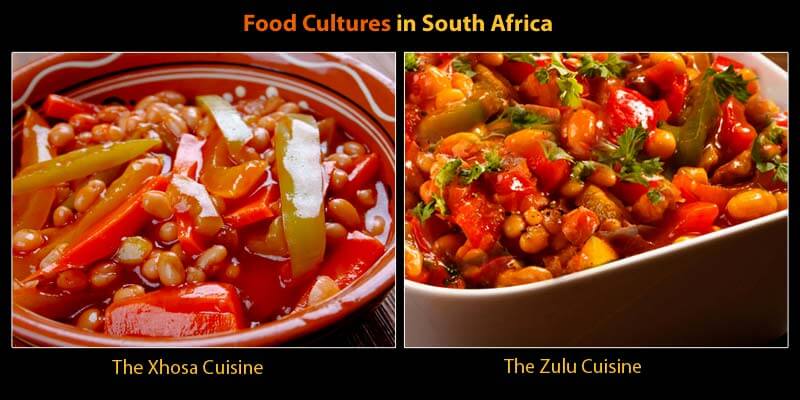
Xhosa:
Often known as the “Red Blanket People”, the Xhosa share lineage with the Zulu as both have descended from the same Nguni Stock. Xhosa is a generalized term which in addition to referring to the Xhosa tribe is also used for other proud clans, like the Thembo, Bomvana, and Pondo. Their traditional colours include red and orange.
The Xhosa Cuisine:
Maize served as the stable diet of the Xhosa clan. They were also fond of beer made from maize and sorghum. Food was cooked in a cast-iron pot on an open air.
Other Popular South African Cultures:
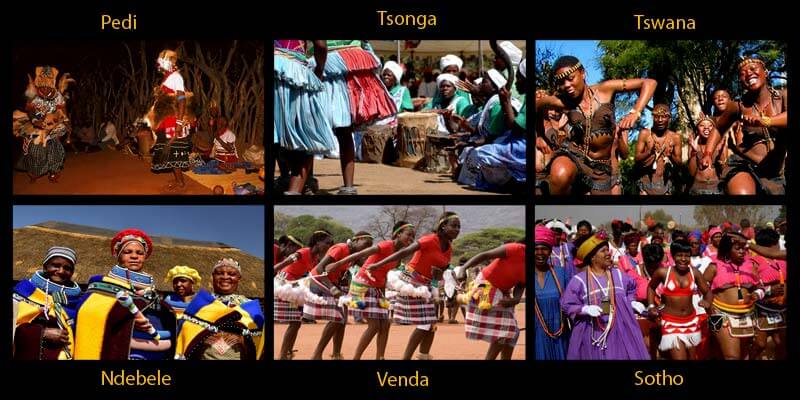
- Pedi
- Ndebele
- Venda
- Sotho
- Tsonga
- Tswana, etc.
Black, coloured, white and Asian are the four major ethnic groups, which account for 80.2, 8.8, 8.4, and 2.5 percent, respectively, population of the country.
The black Africans are divided into four major ethnic groups, namely, Venda, Sotho, Shangaan-Tsonga, and Nguni. The Nguni community further exhibits four different groups, namely, Ndebele, Xhosa, Zulu, and Swazi. There are subgroupings within each of these.
People of Afrikaans descent account for 60% of the white population while the remaining 40% are of British or European origin. Exhibiting mixed lineage, the coloured population resulted from combination of Khoisan genes with African slaves brought here from across the continent, and the white settlers.
Africa Continents - Latest Articles
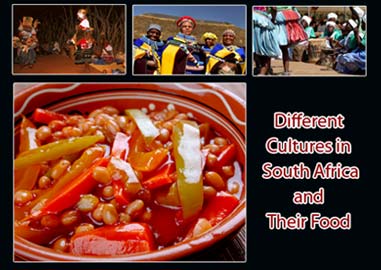
Different Cultures in South Africa and Their Food
Posted By IsaacLocated on the southern most tip of the world�s second largest continent, South Africa is a...

Rivers in Africa Continent by Length and Size
Posted By MariaAfrica - the world's second largest and second most populous continent - is a land of rivers...
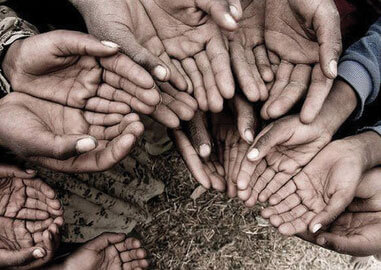
Reasons of Poverty in Africa and Solutions
Posted By MariaAfrica is known to be the second largest and the second most populous continent in the...
